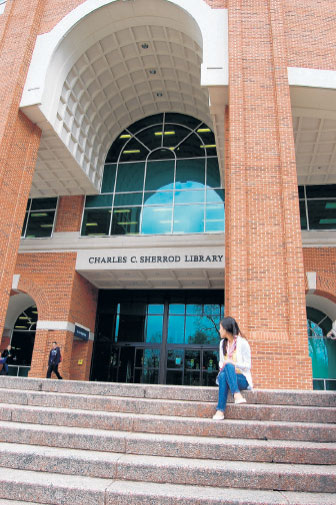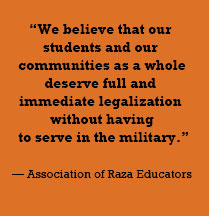
It took Irene Castellon, 19, 10 years to become a legal resident of the U.S. The DREAM Act seeks to help eliminate barriers to higher education for undocumented students who graduate from high school in the U.S. (Kimberly Foli/Courtesy of etsujournalist.com)
JOHNSON CITY, Tenn. — Irene Castellon, 19, is a bright, beautiful young woman studying Spanish at East Tennessee State University. She hopes to use her Spanish degree to help Latino Americans make a better life for themselves. Yet a year ago, college wasn’t an option for her because of her immigration status.
Currently, undocumented immigrants in the U.S. cannot receive financial aid for college. And because proof of legal status is required to open a bank account in the U.S., they cannot receive loans, either.
Each year, approximately 65,000 undocumented students graduate from American high schools, according to the DREAM Act Portal, an online community of undocumented students. A majority of these students, like Castellon, have been living in the U.S. since early childhood, with hardly any recollection of the country they left behind. Yet, some of these students must return to their countries of origin to receive an affordable higher education.
What is the DREAM Act?
The Development, Relief and Education for Alien Minors Act (The DREAM Act) was reintroduced in Congress on March 26, 2009 by Senators Richard Durbin of Illinois and Richard Lugar of Indiana.
Originally, Republican Sen. Orrin G. Hatch of Utah introduced a similar bill in 2001 “to amend the Illegal Immigration Reform and Immigrant Responsibility Act of 1996 to permit States to determine State residency for higher education purposes and to authorize the cancellation of removal and adjustment of status of certain alien college-bound students who are long-term United States residents.”
The Dream Act seeks to allow illegal immigrants legal permanent residency if they graduate from an American high school, entered the U.S. before they were 16, are between ages 12 and 35 at the time the law is enacted, and complete at least two years of college or military service within six years. To qualify, those interested must have been living in the U.S. for at least five consecutive years and must be of “good moral character.”
A California-based teacher’s group objects to the military service portion of the DREAM Act.
“The DREAM Act will create a de-facto military draft for our undocumented youth,” said members of the Association of Raza Educators in a 2007 statement. “We say de-facto because although students are given a ‘choice,’ the fact is that the deplorable and inadequate conditions of Latino schooling will make military enlistment the only ‘choice’ for our undocumented youth.”
The teacher’s group says the DREAM Act could potentially make Latino youth victims of war, if they serve in the military to obtain a green card.
“We believe that our students and our communities as a whole deserve full and immediate legalization without having to serve in the military,” they said in the statement.
In Castellon’s case, her family brought her to the U.S. so that she and her sister could receive a better education.
Born in Nayarit, Mexico, Castellon moved to the Tri-Cities area in 1994, when she was 5. Her father, a legal resident of the U.S., had been working as a migrant farmer for several years before this, traveling back to Mexico every couple of months to see his family.
When she was 8, her family began filling out applications to achieve permanent residency for her, her mother and sister, Karen.
It cost her family around $10,000 for Castellon, her mother and sister to become legal residents of the U.S., she said. And it took 10 years for her to finally be considered “legal,” 11 years for her sister.
Why students don’t apply
Most families, however, cannot afford to become legal citizens.
“Our students, even the undocumented ones, try really hard to make good grades,” said Ashleigh Shu, school counselor at Tennessee High School in Bristol, where very few undocumented students attend.
“When they [undocumented students] find out that college is not an option because of the financial burden on their families, it crushes their spirit.”
Shu said that not many undocumented students at Tennessee High apply for permanent residency because of financial reasons.
“Most of our [undocumented] students have lived here most of their lives,” Shu said before talking about a student who has dreams to attend an elite university, but may not be able to because he or she is not a legal resident.
“They deserve an opportunity for a better education,” said Castellon. “Their parents brought them here so they could pursue a better education so they won’t have to work in factories.”
Castellon, who attended Unicoi County High School, spoke about friends who made great grades in school but cannot attend college because their families cannot afford to pay out-of-state tuition.
“Very few were documented,” she said. “It’s discouraging because if they know they can’t go to college, there is no point in trying to make good grades.”
Shu said she is very excited about the possibility of undocumented students coming into her office and receiving answers about financial aid, should the DREAM Act become law.
“I’m also excited about the possibility of them becoming permanent residents,” she said. “I think a lot of them don’t know how to go about obtaining permanent residency, and neither do their parents.”

The DREAM Act logo. Two hundred eighteen representatives and 60 senators is the critical mass of support needed to pass the DREAM Act in Congress.
Opposition to the DREAM Act
Those opposing the DREAM Act think that offering legal permanent residency to illegal immigrants is like offering amnesty to a group of people who have disobeyed the law. In Tennessee, Republican Senators Lamar Alexander and Bob Corker voted against the proposal.
“The problem with this legislation is that it extends government benefits to people illegally in the United States,” Alexander said in September 2007, when the bill was re-introduced in the Senate. “We cannot restore a system of legal immigration — which is the real American dream — if we undermine it by granting new benefits to those who are here illegally.”
Corker agrees.
“Sen. Corker understands the importance of higher education but has concerns about legislation that could have the effect of encouraging illegal immigration,” said Laura Herzog, Corker’s communications director.
The political action committee Americans for Legal Immigration has opposed the bill.
“This is the Bad Dream Amnesty Act,” said William Gheen of ALIPAC in 2007. “This legislation would replace American students in the limited seats in college at taxpayer expense. Our organization has helped to defeat this measure many times on the state level and now we will try to stop the Senate from passing it.”
Hatch, who is currently a member of the U.S. Senate Committee on Finance, argued that cheaper tuition for undocumented students does not solve the greater problem of their immigration status.
“While I do not advocate granting unchecked amnesty to illegal immigrants,” he said, “I am, however, in favor of providing children —children who did not make the decision to enter the United States illegally— the opportunity to earn the privilege of remaining here legally.”
_____
Editor’s note: This story was previously published on El Nuevo Bristol Herald Courier.



Nicely balanced story about a piece of legislation few voters know about or understand. I hope you follow the discussion through Congress.
Honestly, the parents should have tried to get their kids citizenship. I geuss the theory is that if they are not American citizens, they will take the financial aid, get their degree, and then return to their country of origin but I don’t think they’d do that. I must admit, I’m on the fence on this one since I don’t qualify for financial aid. A lot of students in California have gotten financial aid cut so it’s a bit unnerving to know that I got mine taken away but someone who doesn’t even pay taxes in this country could get it. Maybe they should be required to apply for citizenship while attending school under the DREAM act? That way, they don’t have to wait for citizenship to be approved before they can persue higher education.
It’s better than the alternative, a coworker of mine had someone say that they babysat for them as a tax right off. In return, that person would “appear” to be a citizen so that she could get financial aid. Just something to think about.
Great article, immigration is a very touchy subject and it’s difficult to keep one’s own opinion out of it.
These kids should not be punished for the acts of their parents. There are many who get good grades and want to go on the higher education only to find out that is not an option. If our federal government mandates that the public education is for all it should go all the way through secondary education.
It’s just like a kid whose parents make $100,000 a year and won’t help with college. That student can’t receive financial aid.. is that fair? NO this needs to be fixed.
Give these kids legal residency so they can get on with their lives. JEEZ!!!!!!!!!!!!!!
It’s not that the illegal students need financial aid or something like that. I mean they do but it’s more than that. Because they are illegal, they cannot work, drive or go to college. Passing Dream Act WIll help U.S and many white people aren’t realizing this. It is just so sad.
I think this is a good idea because me myself is a student who didnt have the choice to come over here my parents brought me over here so that i could live a better life jet that i am now almost graduating its very depressing how i cant go to a university or a college because i am not legal to this place. All that time that i have worked so hard to get a good education seems like i should of tried. People out there should have consideration about us students who actually want to have a better Life and want to go to a university but jet we cant because we are illigal in this place.
I think this is great idea and it should become law! I am a sophmore in highschool and i been dreaming about going to college for a qood while and been planning my life basically that none of that can happen because of this dumb law saying us undocumented students cant go to college. Thats being prejudice. WE NEED TO GET THIS LAW TO FOLLOW THROUGH. I wanna pursue my dream of going to college and beginning a new life. My parents brought me to the U.S. to get a better education and better life but thats not gonna happen until this problem is taken care of.
Rocio! how dare u demand something that u r not entitled 2. The problem is not the government or the US, because every single country has laws against illegal immigration. The problem is that ur parents decided that fate for you, so don’t be telling us that “we” created a problem for you cuz we didn’t. If you want to study, then go back to ur country and do it there. No one is stopping you from pursuing your dreams.
I think this Dream Act would have been a great idea and a good example to many innocent undocumented minors. This would motivate them to do good in high school with the hopes of moving on to college. You cannot be looking at the situation from the outside and keep thinking that they will be getting financial aid to finance college then go back to there homeland. You must understand that people come here for better living, better education because this is the land of opportunity. There are alot of american born kids here who have the opportunity to get the good education that the country offers, yet they choose not to utilize it. So don’t blame illegal immigrants for wanting to better their education. The point is we as undocumented immigrants are willing to work no matter what the job might be, in order to provide for our families. On the other hand, I’ve witness americans trying to cheat the system by only applying for part time jobs (less than 20 hrs a week) so that they can collect government benefits (food stamp, section 8 housing…etc) just because they are lazy an want to drain the government. We as immigrant are willing to help build America up not break it down.
I believe the dream act should definately pass. Many of the undocumented students work hard in school but then find out that life after high school they will struggle to go into a higher education due to their immigration status. In my opinion this is unfair, I see many students that have the possibility to go to college without many obsticles and they let it go to waste while an undocumtented student will do anything to have that chance. Undocumented students should not be punished for being brought to a differnt country by their parents when in most cases they were really young and did not know or had no voice in the decision. This is the “land or opportunity” right? so please give us the undocumtented students the opportunity to become something of themselves and make this country better.
I am an undocumened student but i work hard as much as other legal kids do and actually get good grades – AP classes and all that. What’s next? So what? I don’t know how it works but my mom, not an immigrant herself, has an ITIN number and thus pays the tax – a higher one at that. If taxes are the basis wether I deserve public education and other benefits of a citizen, shouldn’t I be qualified? I see the Dream Act not only as my ulitimate lifesaver but also the most practical solution to the whole problem with immigration.
My people are everywhere and they are here to stay. The gov can’t really filter all of them out and do a mass deportation project. By barring them – us – from higher education, we will remain as the scums and slums of society that most label as with. We are forever restricted to social mobility and do we have any right to complain? No, and that’s understandable but whose disgrace would that be? Still America’s. We serve as the black spots on the prestine colors of the star spangled banner but that can be changed by the Dream Act by some degree. If social mobility can be obtained within 6 years, we can be tax payers of this country and even soldiers in the battlefield but more importantly, we become a part of an American legacy – diversity.
And another thing, in theory, undocumented students, kids with pitiful upbringings by american standards, are preservering. Not to say everybody but some of us. Why? When you are familiar with the feeling of hunger, when the need for money drives a loved one in undesirable circumstances, education seems to be the only way out. Education weighs a lot more and the laborous process of learning is worth going through. But I grimace whenever I see kids that don’t use their resources well and when I talk to peers that see education as a hassle. What a waste. We are banned from certain opportunities due to our legal status and so that citizens can get the good stuff. All part of being a citizen right? Legally, we are at the disadvantaged side but effort wise, we can dominate. With or without the Dream Act, legal students shouldn’t “hate” on illegal ones for the accomplishments that they are capable of but just use them illegal lads as a reason to raise the bar for themselves. America’s all for competition anyways, right?